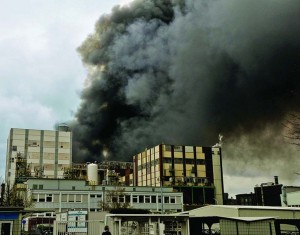
A fire at the Evonik plant in Marl, Germany killed two and created a potential shortage of key resins.
What seemed, just last week, a crisis that could bring the global auto industry to its knees may actually turn out to be little more than an annoyance, or so industry leaders could learn today.
A late March explosion at a chemical plant in Germany left automakers scrambling when it appeared they might soon run out of a resin called PA-12 – alternately known as Nylon-12 – something with applications in everything from fuel tanks to seat fabrics. The problem is that the German firm, Evonik, is the world’s largest producer of PA-12 and a precursor chemical that other manufacturers use to make the material.
By mid-March some automotive suppliers were already warning of impending shortages – triggering emergency meetings around the globe, including one in Detroit that brought together more than 200 automotive executives charged with finding either new supplies or substitute materials.
While a few alternative sources have surfaced – including a plant in Texas that also produces StainMaster Carpets – there may be other chemicals that can work similar magic, industry sources now believe.
“We think we’ve gotten past that graveyard,” Ford Motor Co. Chief Financial Officer CFO Bob Shanks says. “We think we’re going to get through this without any issues.”
Industry executives are gathering again in the Detroit suburb of Southfield today as part of a follow-up scheduled by the Automotive Industry Action Group. They’ll be looking for consensus on alternatives that could fill in for Nylon-12 until supplies are brought back to normal, AIAG officials said.
The meeting involves not only Detroit’s Big Three automakers but international competitors such as Volkswagen and Honda, along with such key suppliers as DuPont Automotive and Delphi.
It turns out many industry vendors were already working on alternative materials even before the fatal fire at the Evonik plant in Marl, Germany because of earlier shortages of Nylon-12. The challenge was to come up with compounds that were equally strong and could stand up in fuel line applications to the alcohol in alternative fuels like E-85.
The auto industry has been particularly sensitive to the threat of shortages ever since last year’s devastating earthquake and tsunami all but shut down most of the Japanese auto industry. The makers faced further disruptions following serious floods in Thailand last autumn.
Speaking in Beijing last week, Chrysler CEO Sergio Marchionne said he was confident alternatives would be found, while General Motors CEO Dan Akerson said he believed that his company could get by until at least the end of May without a disruption – or alternative sources.
Nonetheless, AIAG officials have warned that the industry will need to move fast whatever mix of solutions are used or face at least temporary disruptions.
The fatal Evonik fire underscores the problems facing the industry as auto manufacturers move to reduce the number of suppliers they deal with. A single-sourcing strategy can reduce costs and improve quality but it also leaves a company open to serious disruptions should a key supplier falter.
Industry officials also say the Evonik crisis has exposed the industry’s vulnerability to disruption by terrorists, something AIAG and other trade groups plan to explore in the aftermath of the PA-12 shortage.

http://corporate.evonik.com/en/media/press_releases/pages/news-details.aspx?newsid=26838